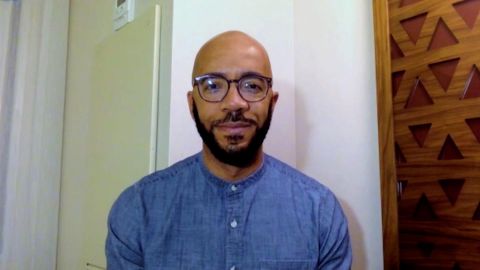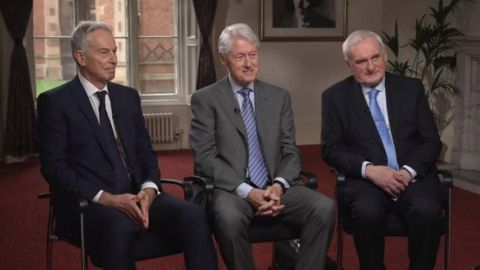Read Transcript EXPAND
BILL CLINTON, FORMER U.S. PRESIDENT: Well, I think we were all privileged to be where we were when we were, and privilege to do our part to get this done. They actually had to sign the agreement. You know, I was just cheerleader, sort of, and gave them to George Mitchell, which was the gift of a generation. So, I think we’re proud. I hope we are.
CHRISTIANE AMANPOUR, CHIEF INTERNATIONAL ANCHOR: Prime Minister Blair, this was something that wrecked many British governments before yours.
TONY BLAIR, FORMER BRITISH PRIME MINISTER: But I was lucky in having a group of people in Northern Ireland, leaders who are prepared to lead and do difficult things. I had an Irish Taoiseach, an Irish prime minister that had — you know, we were coming to the end of the 20th century, and you needed people with a kind of 21st century mentality of the world, and he had that. And then, President Clinton was saying that he was a cheerleader, but he was actually much more than that. He was also an intervener at crucial points in the negotiation. So, we were lucky. It was just one of — like it’s one of these things. You think — I think it’s — it was a combination of circumstances, but the individual leadership of people at that particular moment was crucial in delivering it.
AMANPOUR: And, Prime Minister Ahern, was it that mostly the alignment of the stars, so to speak, in terms of leadership? Was it also about the people on the ground?
BERTIE AHERN, FORMER IRISH PRIME MINISTER: Yes. The parties and people on the ground both, I think from our point of view, and to have the president United States being genuinely interested and Bill to give time and to stay up at night, I mean, we’re — you know, we are a small country and, you know, the things you don’t expect. And I was just so lucky that Tony and I got on so well. He gave us an enormous amount of time. I know you have a 100 other items on this list and, you know, I realized that every prime minister is busy, but when I looked at my agenda against his agenda, and he was prepared to come here, spend days here weeks here, hours and, you know, time and time again. And people talk about 1998, but we went down to 2007 and the same commitment you gave, Tony, and that was an extraordinary commitment.
AMANPOUR: Can I ask the origin story? So, President Clinton, even in your campaign, you know, before the ’92 election, you talked about this, to Irish Americans. You said you would put all your abilities behind trying to get peace. Why? Why did it matter so much, even in ’92?
CLINTON: Well, first of all, I was a student at Oxford when The Troubles began. I remember what a big story it was when Bernadette Devlin was elected to parliament. And I remembered — and I went to Ireland a couple of times while I was a student, and I saw both happiness and the sorrow. And I always felt when I started talking to Irish Americans when I was running for president that we can make a positive difference if we were fair to both sides. And I knew that to do that, we’d have to do something that — the side that was then prevailing would think was unfair, which was to get involved, because the — our whole diplomacy was built around our special relationship with the U.K., which included staying away from Ireland. And even when President Kennedy came here, he didn’t talk about Northern Ireland and no president ever spent the night in Northern Ireland until I did, stayed in the Europa on purpose because it had been bombed so much. And so, I give a lot of credit to the Irish Americans that urged me to do it and to the people in my national security council, especially Nancy Soderberg, who is here today, and who worked this issue for me. Who said, you know, you might not have a lot of experience in foreign policy, but your instincts are right on this, stay. And so, we took the heat. And even the British ambassador, then-admiral Crowe, had been chairman of the joint chiefs of staff under President Reagan and stunned the world, including me, when he endorsed me for president and he called me and he said, you gave me this great job, and now you’re making it impossible for me to do it. I said no, Admiral, you’re going to be more important than ever. This is a good thing.
AMANPOUR: So, you’re U.S. ambassador had his marching orders from you. Prime Minister Blair, here you are. You have come in as a labor prime minister for the first time in a generation and you have an overwhelming mandate and you start by doing this. I mean, it’s — you were elected in ’97. The negotiations started in ’97. Why? Why was it so important to you to put that much political capital?
BLAIR: Yes. I think — I mean, there was a personal reason, actually, to a degree, rather like the president. I mean, my family, on my mother’s side, come from Donegal. I’d grown up with a very clear understanding of The Troubles. And, you know, you would wait literally every morning in the 1970s and 1980s, 1990s, to use on the U.K. media of acts of terrorism and destruction, death — story — tragic stories of the families of the victims of The Troubles. So, it was all — it was part of my own personal history. But I also thought, you know, John Major, who would be my predecessor as prime minister had tried and got somewhere, there was some stirring you could see, some possibility, even though the thing had broken down by the time we came to office, and I thought — I mean, I’ve often wondered whether it was just because it was straight into government and maybe the — you know, you had this feeling that everything was possible. And so, you’re prepared to give what most people thought was impossible about. So, what — for all of those reasons, the first speech I made as prime minister was here in Northern Ireland. And then, you know, we — once we decided to work on it, we put a lot into it.
About This Episode EXPAND
Tony Blair, Bill Clinton and Bertie Ahern join Christiane for an exclusive interview on the 25th anniversary of the Good Friday Agreement. Author Clint Smith discusses parenthood and his new poetry collection “Above Ground.”
LEARN MORE

